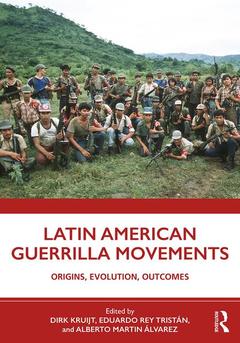Latin American Guerrilla Movements Origins, Evolution, Outcomes
Coordonnateurs : Kruijt Dirk, Rey Tristán Eduardo, Álvarez Alberto Martín

Organized around single country studies embedded in key historical moments, this book introduces students to the shifting and varied guerrilla history of Latin America from the late 1950s to the present. It brings together academics and those directly involved in aspects of the guerrilla movement, to understand each country?s experience with guerrilla warfare and revolutionary activism.
The book is divided in four thematic parts after two opening chapters that analyze the tradition of military involvement in Latin American politics and the parallel tradition of insurgency and coup effort against dictatorship. The first two parts examine active guerrilla movements in the 1960s and 1970s with case studies including Bolivia, Nicaragua, Peru, Argentina, Chile and Uruguay. Part 3 is dedicated to the Central American Civil Wars of the 1980s and 1990s in Nicaragua, El Salvador and Guatemala. Part 4 examines specific guerrilla movements which require special attention. Chapters include Colombia?s complicated guerrilla scenery; the rivalling Shining Path and Tupac Amaru guerrillas in Peru; small guerrilla movements in Mexico which were never completely documented; and transnational guerrilla operations in the Southern Cone. The concluding chapter presents a balance of the entire Latin American guerrilla at present.
Superbly accessible, while retaining the complexity of Latin American politics, Latin American Guerrilla Movements represents the best historical account of revolutionary movements in the region, which students will find of great use owing to its coverage and insights.
1. Origins and Evolution of the Latin American Guerrilla Movements; 2. Cuba and the Latin American Left; Part 1:First Revolutionary Ripple: The Imitation of the Successful Example; The Sixties and the Foco Guerrilla; 3.Guerrilla Movements in the Dominican Republic; 4.Notes on the Guerrilla Experience in Venezuela (1958–1994); 5. The First Cycle of the Guatemalan Insurgency (1954–1972); 6. The Peruvian Guerrilla Movements of the 1960s; 7. The Bolivian Guerrilla Movements in Four Phases; Part 2:Second Revolutionary Ripple: the Adaptation of a Non-Viable Model; The Urban Experience: Rethinking the Guevarist Foco; 8.Guerrillasin Brazil, 1960s and 1970s; 9. The Uruguayan Guerrilla Experience (1963–1972); 10. Guerrillas in Argentina: A History of Four Decades (1950–1980); 11. Formation and Development of the Armed Left in Chile (1965–1990); Part 3:Third Revolutionary Ripple: Learning from Experiences and New Influences; The Central American Civil Wars 12. The Sandinista Guerrilla, Revolution and Legacy; 13. The Revolutionary Movement in El Salvador; 14. The Second Cycle of the Guatemalan Insurgency (1970–1996); Part 4:Special Cases; Singularities and Transversalities in the Insurgent Cycle; 15. Colombia: 70 years of Guerrilla Warfare; 16. Sendero Luminoso, the MRTA, and the Peruvian Paradoxes; 17. Mexico’s Armed Socialist Movement During the 1960s and 1970s; 18. The Emergence of The Junta Coordinadora Revolucionaria: Historical Context and Political Process in The Southern Cone; A Balance of the Latin America Guerrilla
Dirk Kruijt is Professor Emeritus of Development Studies at Utrecht University, and currently is a research fellow at the Instituto Universitário de Lisboa and at the Centre for Military Studies at Stellenbosch University, South Africa. He has published widely about military governments and revolutions; insurgency and counterinsurgency; and urban violence and non-state actors. He has been a visiting scholar at universities and research institutes in Latin America and Europe. In addition, he has been a policy advisor to the Netherlands Ministry of Foreign Affairs, assigned to Latin America on multiple occasions. His most recent monograph is Cuba and Revolutionary Latin America (2017); Ethnography as Risky Business: Field Research in Violent and Sensitive Contexts (2019) was published in coedition with Kees Koonings.
Eduardo Rey Tristán is Full Professor of Latin American History at the University of Santiago de Compostela, Spain. After completing his PhD on the guerrilla movements in Uruguay, he has specialized in political violence and contemporary Latin American revolutionary movements. He has carried out long-time field research in the Rio de la Plata region and Central America. He is cofounder and coordinator of the Revolutionary New Left International Research Network on Political Violence. He has published monographs, articles and book chapters in several European and American countries, among them: La Izquierda Revolucionaria Uruguaya, 1955–1973 (2006), and Revolutionary Violence and The New Left:Transnational Perspectives (coedited with Alberto Martín, New York: Routledge, 2016). He is currently working on a political biography of the Italian left-wing editor and activist Giangiacomo Feltrinelli (expected in 2020).
Alberto Martín Álvarez holds a PhD on Latin American Studies from the Universidad Complutense de Madrid. He is currently Distinguished Professor at the Department of Public Law of
Date de parution : 12-2019
17.8x25.4 cm
Date de parution : 12-2019
17.8x25.4 cm
Thème de Latin American Guerrilla Movements :
Mots-clés :
Young Men; Partido Comunista De Cuba; Latin American Studies; West Germany; Latin American Politics; Latin American Guerrilla Movements; Central America; Frente Nacional; Political Violence; Punto Fijo; Revolution; Mao Zedong; Social Movements; Junta; Latin American Left; Military Junta; Guerilla; Partido Revolucionario Dominicano; Global Conflict; De La Verdad; Insurgencies; Central American Civil Wars; Armed Left; Directorio Revolucionario; Dirk Kruijt; Chapultepec Peace Accords; Alberto Martín Alvarez; Guerrilla Foco; Eduardo Rey Tristán; Partido Obrero Revolucionario; Civil Society; Revolutionary Left; Civil-Military Relations; Sierra Tarahumara; Political Development; PRT; Sandinista National Liberation Front; Latin American Guerrilla; Cuban Revolution; FMLN; Che Guevara; ALN; Revolutionary Armed Forces of Colombia (FARC); VPR; Pink Tide; Guerrilla Fronts; Shining Path; Douglas Bravo; Tupac Amaru; Montoneros; Southern Cone; Timothy P; Wickham-Crowley; civil wars; insurgency movements; active guerrilla movements; military involvement



